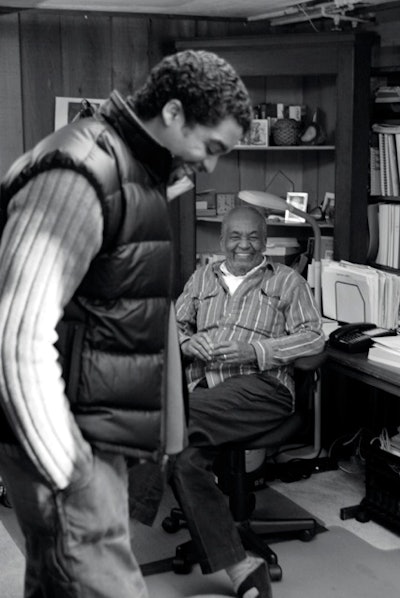 Edmund Gordon with Dr. David Wall Rice
Edmund Gordon with Dr. David Wall RiceBefore most knew what an achievement gap was, Dr. Edmund W. Gordon was working to eliminate it. He is regarded as one of the foremost scholars on divergent learning styles and championed supplemental education long before it was popular. In fact, Gordon popularized the term. He was also an architect of the nation’s Head Start program in the 1960s. Today, however, at 91, Gordon is still beating the drum of education reform as loud as he did half a century ago with a historic commission to get to the bottom of assessment.
Every bit of Gordon’s nine decades is present when he talks to you. A careful man, he takes slow deliberate pauses between thoughts and drags his sentences to understanding. His hawk-like eyes dart about under his bushy gray eyebrows and wisps of gray hair on his balding head to make sure you’re paying attention, and in his presence, you cannot help but feel like you should be taking notes. His face exemplifies the nickname many of Gordon’s former pupils have given him, “The Professor.”
Gordon could retire comfortably at his home in upstate New York having established a tremendous legacy. He is the John M. Musser Professor Emeritus of Psychology at Yale University and Richard March Hoe Professor Emeritus of Psychology and Education at Columbia University’s Teachers College, among many other distinctions. He’s published 175 articles in scholarly journals and authored or edited at least 15 books since his first in 1966. But instead of relaxing in his golden years, for the past two, Gordon has been leading The Gordon Commission, a study group of noted scholars with the stated goal of exploring what education assessment will be, and should become, by 2050. The commission’s findings will be made public next winter.
“Providing the conceptual leadership for the group has probably been the most challenging intellectual experience of my life,” says Gordon. “I sometimes complain that the opportunity came to me at the second weakest point in my life, second after childhood. I’m 91 now and trying to do things I would have much rather tackled at 60.”
As a nonagenarian, however, Gordon is leading the most comprehensive study of issues within assessment to date with funding from Education Testing Services, the world’s largest private nonprofit educational testing body, an organization responsible for standardized tests including the GRE. Gordon has leveraged his reputation and ETS’ support to gather leading minds to parse out issues that have rendered assessment in the American school system so problematic.
Members of the Gordon Commission include heavy hitters from around the worlds of education, psychology and psychometrics. Leading figures like Dr. Diane Ravitch, Dr. Lauren Resnick and Dr. Claude Steele are a few among the 33 assembled. Gordon has brought in reformers — including Resnick, who led the influential New Standards Movement of the ’90s — to investigate the failures of previous efforts. The commission has even taken their inquiry to the streets, holding public forums to engage stakeholders, educators, parents and students around issues in assessment and possible solutions.
Their mission is to anticipate the future of testing. But beyond that and the commission’s strategic engagement is the belief that changing what’s tested for will serve to change what’s taught and how — hopefully leading to better outcomes for students who fall through the cracks of the existing system. In that effort, the commission has produced studies in emerging areas of assessment science, represented in two dozen white papers.
“One of the things we’ve been exploring in the commission is the relationship between the affective and situative domains in relation to the cognitive domains,” says Gordon, describing one study. “We’re beginning to understand that, in human intellectual functions, the affective (or the emotional) and the social situations in which problems are engaged are as important as the cognitive processes on which we have been focused.” He says that assessment of the future must reconcile these three “sense-making” processes and how academics deal with this dynamic reality in pedagogy and how assessment opens up years of additional study.
With the work of the commission wrapping up, however, Gordon says he’s left with a sense of pride in having engaged the challenge presented in its mission, but also a deep sense of frustration in the recognition that he’s raised questions he doesn’t have time to answer. With some perspective he concedes, “This is too important an initiative to rest on the shoulders of such an old man.” But he likely won’t have to shoulder the work alone.
“It is rare that you have so many thought leaders and change agents in a room at one time,” says Dr. David Wall Rice, commissioner and professor of psychology at Morehouse College. “And the people in the room are influenced by, and almost by default, are students of Professor Gordon because he’s had such an incredible impact on education. We get to look back at what his thinking has been, what it is presently and work with him to predict what education will be.”
Rice says that because of “The Professor’s” influence and reach, the work of the Gordon Commission could be the academic community’s best bet at bringing about some lasting change.



















